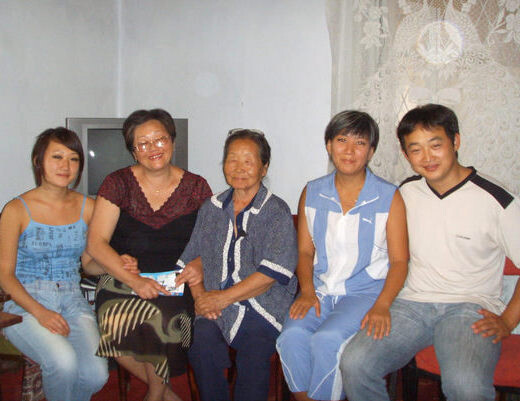hankyoreh
Links to other country sites 다른 나라 사이트 링크
Gov’t snubs descendent of independence fighter

When she spoke, she showed deep sorrow and anger. She is the eldest granddaughter of Heo Wi, known as Wangsan (1854-1908), who was a leader of a citizens’ army that fought against colonialist Japan. She is Heo Ro-ja, 80, a second-generation Korean living in Uzbekistan, and the oldest survivor of the Heo clan.
Heo visited the Korean embassy in Uzbekistan in the middle of last year and demanded the compensation the Korean government gives to the families of former pro-independence activists, but her demand was "ignored." After visiting the embassy twice, she has not visited it again and has ceased contact with it, said niece Choi Nathalia, 49, her voice trembling.
I met the two in Samarkand, a city of history and tourist attractions, on Sunday. It is four hours by train from the capital city Tashkent. When we met, tears gathered in the eyes of the ’granddaughter of a general,’ who said that I was her first visitor from South Korea.
Heo has never visited her fatherland, but she could still speak the Korean language. She talked about her grandfather. "Whenever he came home after one or two months, as soon as his clothes dried, he went out again, taking a number of people with him. I heard such stories many times from my mother," she said.
Wangsan, a scholar and a justice of the high court when he began his anti-Japanese activities, is considered a hero in the movement. He led a 300-man force to attack Japan’s Residency-General in 1907. Due to the incident, Wangsan became the first prisoner of Seodamun Prison sentenced to death; his four sons fled to Manchuria and Siberia.
"If caught, they could have been massacred," Heo said. "Therefore, the family of grandfather’s youngest son (Heo Guk) went to Siberia and the families of his second (Heo Yeong) and third (Heo Jun) sons went to Manchuria."
The clan was shattered, and those that went to Siberia were then driven to Central Asia by force by Stalinist Russia in 1937, forced to live like nomads far from their native land.
The government conferred citizenship upon Heo Guk’s sons Georgi, 62, and Bladslav, 55, in July this year. Wangsan’s descendants belatedly attracted attention in South Korea, and Heo Yeong’s children have received compensation. Only Wangsan’s eldest son, Heo Hak, and his family members have sunk into obscurity. Heo Hak won a medal from the government, but none of his two daughters has received compensation or recognition from South Korea.
An official of the Ministry of Patriots and Veterans Affairs said on Thursday, "Heo Hak was registered as a patriot in 1991, but Heo Ro-ja was not recognized as such until March this year. She hasn’t received any financial support from the government." The ministry has thus violated a regulation under which a citizen of a foreign country can get compensation if he or she is proven to be the family member of a pro-independence activist.
Yun Deok-ho, a director of documentaries who has chronicled Wangsan’s descendants for three years, said, "Heo Ro-ja’s family may have been isolated because they had no sons. To treat the offspring of former pro-independence activists with honor, the government should pay compensation according to Heo Ro-ja’s wish, either through granting her citizenship or compensation."
Heo Ro-ja, who has lost sight in her right eye and suffers from pain in her legs, lives with the family of her nephew, having never married. She receives a pension of W40,000 (US$42) every month from the Uzbek government. "Can I go to Korea?" she asks repeatedly.
Editorial・opinion
![[Editorial] Penalties for airing allegations against Korea’s first lady endanger free press [Editorial] Penalties for airing allegations against Korea’s first lady endanger free press](https://flexible.img.hani.co.kr/flexible/normal/500/300/imgdb/original/2024/0502/1817146398095106.jpg) [Editorial] Penalties for airing allegations against Korea’s first lady endanger free press
[Editorial] Penalties for airing allegations against Korea’s first lady endanger free press![[Editorial] Yoon must halt procurement of SM-3 interceptor missiles [Editorial] Yoon must halt procurement of SM-3 interceptor missiles](https://flexible.img.hani.co.kr/flexible/normal/500/300/imgdb/child/2024/0501/17145495551605_1717145495195344.jpg) [Editorial] Yoon must halt procurement of SM-3 interceptor missiles
[Editorial] Yoon must halt procurement of SM-3 interceptor missiles- [Guest essay] Maybe Korea’s rapid population decline is an opportunity, not a crisis
- [Column] Can Yoon steer diplomacy with Russia, China back on track?
- [Column] Season 2 of special prosecutor probe may be coming to Korea soon
- [Column] Park Geun-hye déjà vu in Yoon Suk-yeol
- [Editorial] New weight of N. Korea’s nuclear threats makes dialogue all the more urgent
- [Guest essay] The real reason Korea’s new right wants to dub Rhee a founding father
- [Column] ‘Choson’: Is it time we start referring to N. Korea in its own terms?
- [Editorial] Japan’s rewriting of history with Korea has gone too far
Most viewed articles
- 160% of young Koreans see no need to have kids after marriage
- 2Presidential office warns of veto in response to opposition passing special counsel probe act
- 3Months and months of overdue wages are pushing migrant workers in Korea into debt
- 4Japan says it’s not pressuring Naver to sell Line, but Korean insiders say otherwise
- 5S. Korea “monitoring developments” after report of secret Chinese police station in Seoul
- 630th anniversary Wednesday Demonstration pushed out of memorial site by far-right
- 7[Editorial] Penalties for airing allegations against Korea’s first lady endanger free press
- 8[Special reportage- part I] Attending the funeral of the victim of a South Korean war crime in Vietn
- 9Korean cookbook boom brings work of culinary masters to global audiences
- 101 in 5 unwed Korean women want child-free life, study shows